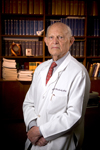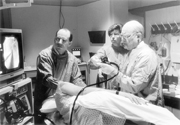May 6, 2009

Basil Hirschowitz. Download image.
BIRMINGHAM, Ala. - The University of Alabama at Birmingham (UAB) Division of Gastroenterology and Hepatology will celebrate its 50th anniversary on May 29 with a festschrift honoring Basil I. Hirschowitz, M.D.
Basil I. Hirschowitz, M.D., Ph.D., is the medical pioneer who invented the first fiber optic endoscope that became the standard for visualizing and treating virtually every cavity in the body. Hirschowitz, professor emeritus of medicine, physiology and biophysics, joined the UAB faculty in 1959 as associate professor of medicine and founder of the Division of Gastroenterology and Hepatology, a post he held for 29 years.
A festschrift is a celebration of an individual's life work. The term, borrowed from the German language, can be translated as celebration publication or celebratory writing. In academia a festschrift is a book or group of publications put together for the occasion of the honoree's retirement, 60th or 65th birthday or other notable career anniversary. People who have collaborated with the honoree and have used his work as a foundation for their own research, often former students, comment on their collaborations and the impact of the honoree's work on the academic discipline.
 |
| GI 50th Anniversary. Download image. |
The festschrift will be held in the UAB Hospital West Pavilion Conference Center from 1 to 4 p.m., and will be followed by a 7 p.m. seated dinner at The Club celebrating Hirschowitz and the division's milestones. Continuing Medical Education credit is available for lecture attendees through the UAB Office of Continuing Medical Education. Support for the lectures is provided by educational grants from AstraZeneca, Shire, Olympus and Takeda Pharmaceuticals. There is no charge for the lectures but attendees must register. Tickets to the dinner are $50 each and must be purchased by May 20. To register for the lectures or purchase tickets, call 205-975-5659 or email vgloftin@uab.edu.
This festschrift, which will be oral presentations of these types of publications, will celebrate Hirschowitz's contributions to both the field of to the gastroenterology and to the division. It will include academic lectures by Joel Edward Richter, M.D., Temple University; Angel I. Lanas, M.D., Ph.D., University of Zaragoza, Spain; and Don Powell, M.D., University of Texas Medical Branch at Galveston, who is the third Basil I. Hirschowitz Visiting Professor at UAB.
"Dr. Hirschowitz's leadership at UAB - and his mentoring of two generations of medical students and GI specialists who practice all over the United States and around the world - has had a tremendous impact on the development of the specialty and UAB as an institution," said C. Mel Wilcox, M.D., director of the UAB Division of Gastroenterology and Hepatology. "He laid a foundation of excellence in research, teaching and patient care on which we continue to stand, and which we want to celebrate."
Prior to joining UAB, Hirschowitz was a member of the medical school faculties at the University of Michigan and Temple University. It was at the University of Michigan in 1957 that he and his team invented the coated glass fiber that made possible the development of the prototype flexible endoscope. Hirschowitz tested the prototype by swallowing it himself. This innovation revolutionized the practice of gastroenterology and also was a key development in optical fiber communication in multiple industries. Hirschowitz's original invention is housed at the Smithsonian Institution in Washington, D.C.
His major research involved the normal gastric functions and pathophysiology of acid-peptic diseases such as peptic ulcer, reflux and, particularly, Zollinger-Ellison Syndrome. A career that spans six decades also includes leadership in clinical trials that were the forerunners to new pharmaceutical treatments in gastroenterology. Those trials paved the way for widespread use of medications the public knows today by such names as Pepcid, Prilosec and Nexium.
Hirschowitz retired as professor in the UAB Department of Medicine's Division of Gastroenterology and Hepatology in 1995 after 36 years of service and, until recently, continued to work actively as professor emeritus in the School of Medicine at UAB, focusing on clinical practice and research. He was named distinguished faculty lecturer in 1988 and professor emeritus in 1996. In December 2008, the new endoscopy unit in UAB Hospital was formally dedicated the Basil I. Hirschowitz Endoscopic Center of Excellence.
A native of Bethal, South Africa, Hirschowitz earned three degrees at the University of Witwatersrand in Johannesburg, including the equivalent of the American degrees of M.D. and Ph.D. In 1950, he left South Africa to work in London, first at the Royal Postgraduate Medical School and then at the Central Middlesex Hospital. In 1953, he earned admittance as a member of the Royal College of Physicians in both Edinburgh and London. He later was awarded fellowship in both.
Hirschowitz's leadership in gastroenterology has garnered him several meritorious honors, most notably the General Motors Cancer Research Foundation Charles F. Kettering Prize, the Julius Friedenwald Medal from the American Gastroenterological Association, the Schindler Medal from the American Society for Gastrointestinal Endoscopy, the Distinguished Scientist Award from the American College of Gastroenterology, and the Laureate Award of the American College of Physicians, of which he also was elected master.
In 2004, he was presented an honorary doctor of medicine by the Sahlgrenska Academy of Goteborg University, Sweden. He was named a fellow in the Royal Society of Medicine, London, and was elected to the Alabama Academy of Honor.
About UAB
The UAB Division of Gastroenterology and Hepatology has a comprehensive clinical program related to all diseases of the digestive tract and liver. The division is composed of 19 faculty members active in the areas of teaching, patient care and research. It operates inpatient and consultative services at UAB Hospital and Birmingham Veterans Affairs Medical Center. Outpatient clinics are held at both The Kirklin Clinic and Birmingham VA Medical Center. The division's comprehensive research facilities and programs allow for the development of new understandings and therapies associated with gastrointestinal disorders.